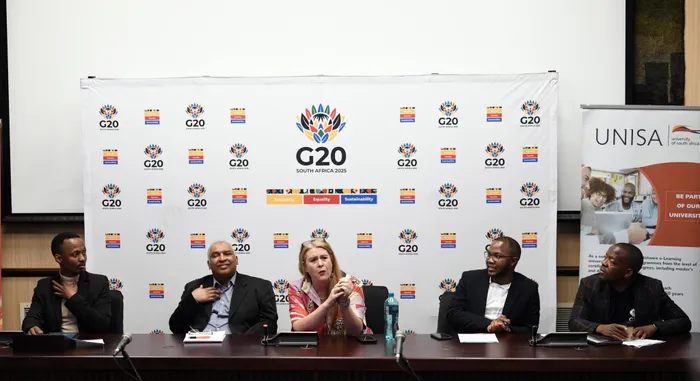South Africa leverages G20 presidency to tackle global financial reform and climate justice at UKZN townhall

UKZN College of Law and Management Studies, Academic Leader for High Impact Community Engagement and Internationalisation, Dr Sanele Gumede, UKZN College of Agriculture, Engineering and Science, geographer, Professor Sagie Narsiah, UKZN College of Law and Management Studies, Academic Leader for High Impact Community Engagement and Internationalisation, Professor Thea van der Westhuizen, Unisa College of Economic and Management Sciences, economist and lecturer, Dr Mzwanele Ntshwanti, and Nelson Kgwete of public diplomacy at Dirco, were part of the panel discussion on climate change, reform of global financial institutions, international relations and national interest.
Image: Department of International Relations and Cooperation/ Facebook
A G20 Townhall Outreach was hosted at the University of KwaZulu-Natal (UKZN) Westville Campus on Wednesday.
Discussions covered a range of topics, including basic services, infrastructure, and local realities; youth entrepreneurship and economic opportunity; education, skills, and social justice; global engagement, diplomacy, and public participation; and global financial institutions, economic reform, and justice.
The event, a collaborative effort between the Department of International Relations and Cooperation (Dirco), the University of South Africa (Unisa), and UKZN, focused on “Financial Inclusion for Economic Development: Creating Access to Benefit Grassroots Economies.”
How to push for reforms that make institutions like the International Monetary Fund (IMF), World Bank, etc., more responsive to our realities:
Unisa College of Economic and Management Sciences, economist and lecturer, Dr Mzwanele Ntshwanti, said South Africa has taken the lead by prioritising debt sustainability as part of its priorities for its G20 presidency.
He said significant effort has been dedicated to this area. This work is part of a broader initiative to reform global financial institutions such as the World Bank, the IMF, and the WTO, among others, to address existing challenges.
“We’re having a developmental crisis in Africa and in other emerging economies as much as we are having a debt problem. This is our biggest challenge, and in the form of the G20, we’ve then had the common framework, but only about two countries have participated or applied for debt restructuring under the common framework, which are Zambia and Ghana,” Ntshwanti said.
He explained that a significant issue arises from the privatisation of creditors— multilateral Development Banks (World Bank, IMF) and bilateral creditors (Asian countries)— are over indebted nations. In Africa, the high cost of capital is a major concern. South Africa, through the G20, has tried to highlight this. African countries face interest rates two to three times higher than their Global North counterparts when accessing global financial markets for development funding.
“This is precipitated by a number of issues, such as the exposure of our countries to debt, but also the risk perception that we don’t have bankable projects. Which again would speak to the ideas about energy transition, development, and climate resilience, which would be applicable for provinces such as KZN,” Ntshwanti said.
How can climate justice be ensured?
UKZN College of Agriculture, Engineering and Science, geographer, Professor Sagie Narsiah, said that to address climate justice, we have to look at climate injustice first because we live on a continent which is experiencing the effects of a minority.
“While we want to be inclusive and so on, we need to address the elephant in the room, which is unequal power relations. Those who have caused the problem need to take responsibility for that problem, and they need to solve it,” Narsiah said.
“One of the ways in which they can start to solve this problem is by addressing issues such as funding the just energy transition.
“On the other hand, the subsidies to those who are causing the problem. The problem here is the burning of fossil fuels.”
He said that unless we address issues like inclusivity, our efforts will be hollow. We must speak up and take action, as we are living this reality.
How can South Africa leverage its G20 leadership to promote economic models benefiting developing regions like KZN, focusing on inclusive growth, fair trade, and regional integration?
UKZN College of Law and Management Studies, Academic Leader for High Impact Community Engagement and Internationalisation, Dr Sanele Gumede, said we have a problem of solving current issues, and also trying to invest in the future.
Gumede said the dilemma lies in allocating resources between addressing immediate societal suffering and investing in sustainable development for future progress. The question then becomes, how does one effectively divide these crucial investments?
“You’ll find that infrastructural budgets, the spend from the government, will only speak, not even making 10% over the last five years. How much we spend on infrastructure is literally way less than what it should be to get our sustainable growth that we would like to have. You think Africa, South Africa, having the two international ports, the busiest ones, big ones, that really can lead to regional development,” Gumede said.
thobeka.ngema@inl.co.za